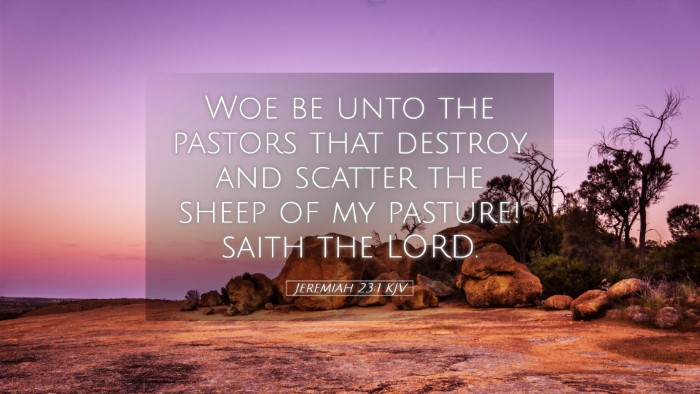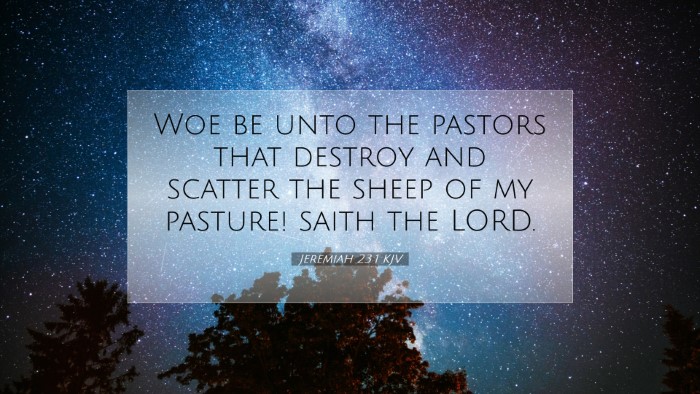Commentary on Jeremiah 23:1
Verse: "Woe to the shepherds who destroy and scatter the sheep of my pasture!" declares the LORD.
Introduction
This prophetic declaration from Jeremiah serves as a stern warning to the leaders of Israel, referred to metaphorically as shepherds. The shepherding motif is prevalent throughout Scripture, symbolizing guidance, protection, and care. In this verse, God expresses His displeasure with those in positions of spiritual authority who fail to fulfill their duty towards His people.
Contextual Analysis
Jeremiah 23 occurs during a tumultuous period for Jerusalem and its inhabitants, marked by impending judgment and exile. The chapter addresses the corrupt leadership of Israel, emphasizing their role in the spiritual welfare of the nation. This context underscores the serious implications of failing to guide the flock towards righteousness.
Exegesis
Woe to the Shepherds
Matthew Henry notes that 'woe' signifies a message of doom directed at those who are culpable for the spiritual and moral degradation of their community. The term 'shepherds' symbolizes the leaders—both political and spiritual—who should guide the people in the ways of the Lord. Their failure to do so evokes divine judgment.
Destroy and Scatter
Albert Barnes emphasizes that the shepherds' actions are destructive, leading to the scattering of the flock. Instead of nurturing and protecting, they expose the sheep to danger, which reflects the consequences of negligence in spiritual oversight. This commentary echoes the teaching of Christ, where He identifies Himself as the Good Shepherd who lays down His life for the sheep (John 10:11), contrasting the behavior of those unfaithful leaders.
Theological Implications
Adam Clarke provides insight into the theological dimension of this verse, stressing that God's concern extends beyond mere governance. Spiritual leadership demands accountability and a deliberate commitment to the welfare of the community. The scattered sheep represent God’s people who have been led astray, unable to find the path of righteousness due to poor leadership.
Divine Judgment
The Lord’s declaration holds a promise of judgment against those who mislead. The expectation for shepherds is not only to lead but to nurture and protect their flock. This theme of judgment emphasizes God's active involvement in the affairs of His people, demonstrating that He does not overlook the misdeeds of leaders.
Applications for Today
This verse finds relevance in contemporary church leadership and pastoral care. It serves as a significant admonition for leaders to reflect on their responsibilities towards their congregations.
- Accountability: Church leaders must recognize their accountability to God for the souls in their care. Ezekiel 34 echoes this call for responsibility towards the flock.
- Integrity in Leadership: The moral integrity of leaders is paramount. Spiritual leaders must exemplify the values they preach, ensuring they do not lead congregants astray.
- Compassion and Care: Leadership should be characterized by deep compassion and an earnest desire for the spiritual well-being of the people.
- Prevention of Scattering: Leaders must take preventive measures against division and confusion within the church, actively working towards unity and cohesion.
Conclusion
Jeremiah 23:1 serves as a potent reminder of God's expectations for leaders within the faith community. The serious nature of the woe pronounced against negligent shepherds speaks to the heart of divine justice and care for His people. As pastors, students, theologians, and scholars engage with this text, may it provoke deep reflection on the role of leadership in nurturing and safeguarding those entrusted to their care.


